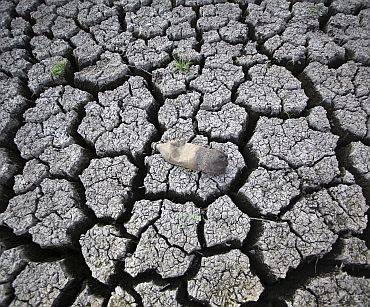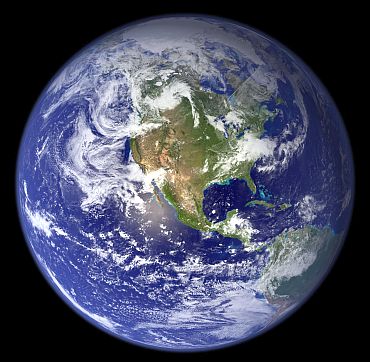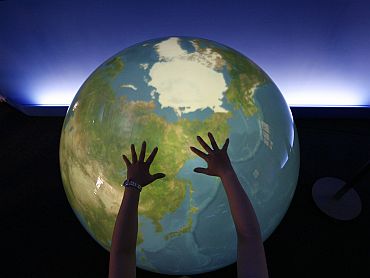Photographs: Oswaldo Rivas/Reuters Kalpana Palkhiwala
Earth Day 2010 can be a turning point to advance climate policy, energy efficiency, renewable energy and green jobs. Earth Day Network is galvanising millions who make personal commitments to sustainability.
Earth Day 2010 is a pivotal opportunity for individuals, corporations and governments to join together and create a global green economy. Join the more than one billion people in 190 countries that are taking action for Earth Day.
...
Fate of the environment is our own fate
Photographs: NASA Goddard Space Flight Center/Handout/Reuters
This is a time to remember the environmental challenges facing us -- an opportunity to live better lives, help the planet, and build a strong economy. One need not choose to have either a healthy environment or a strong economy -- one can have both.
While many say that steps to solve environmental challenges are too costly, solving these problems presents a great opportunity for businesses to thrive by providing cleaner energy, greener buildings, efficient transportation, and less wasteful ways of living.
The fate of the environment is our own fate.
Earth Day is the most widely celebrated international event and provides a chance to remember what an amazing planet we live on; the only planet in our solar system teeming with incredible biodiversity.
What Earth Day is all about
Photographs: Yuriko Nakao/Reuters
On April 22, 1970, Earth Day marked the beginning of the modern environmental movement and henceforth it is celebrated on this day every year.
Countries celebrate Earth Day in different ways, by cleaning cities, releasing stamps, arranging competitions among children, educating the masses about earth resources and its sustainable use through leaflets, etc.
How India is celebrating Earth Day
Photographs: Raj Patidar/Reuters
The Ministry of Earth Sciences has proposed to celebrate the event by organising activities on the theme -- "Save Earth (covering land, ocean and atmosphere)".
Various other topics such as greenhouse effect, ozone hole, its causes and effects, global warming, sustainable use of natural resources, impact of climate change on Indian monsoon, significance of deforestation and afforestation, ocean resources (living & non living), energy resources (conventional & non-conventional), desalination, tsunami early warning system, ocean technology, marine instruments, polar science and earthquake studies have also been proposed for the day's celebration.
Schools have also been invited to involve students in different activities like essay competition, drawing/painting, poster making, tree plantation, writing slogans on preserving the nature, quiz competition and others.
Let's commit ourselves to protect the environment
Image: Taipei 101, the world's tallest building, displays an Earth Day message in TaipeiPhotographs: Nicky Loh/Reuters
Earth day inspires all to share the value of protecting the environment by committing ourselves to:
1) Using less water by taking showers instead of baths; fixing leaks, turning off the tap while brushing and by buying efficient fixtures by looking for the WaterSense label.
2) Saving electricity by buying Energy Star products (an international standard for energy efficient consumer products), and changing bulbs to compact fluorescents.
3) Reusing and recycling products.
4) Testing homes for Radon, a naturally occurring, odourless gas that can seep into houses and cause lung cancer.
5) Commuting by using public transportation, carpool, walk, or bike whenever possible to reduce air pollution and save on fuel costs.
6) Using chemicals safely by locking up pesticides, paints, and cleaners where children can't reach them.
7) Checking on local air quality.
8) E-cycling old computer, DVD player, or other electronic goods, which helps keep hazardous substances out of landfills.
The writer is deputy director, Press Information Bureau, New Delhi






article